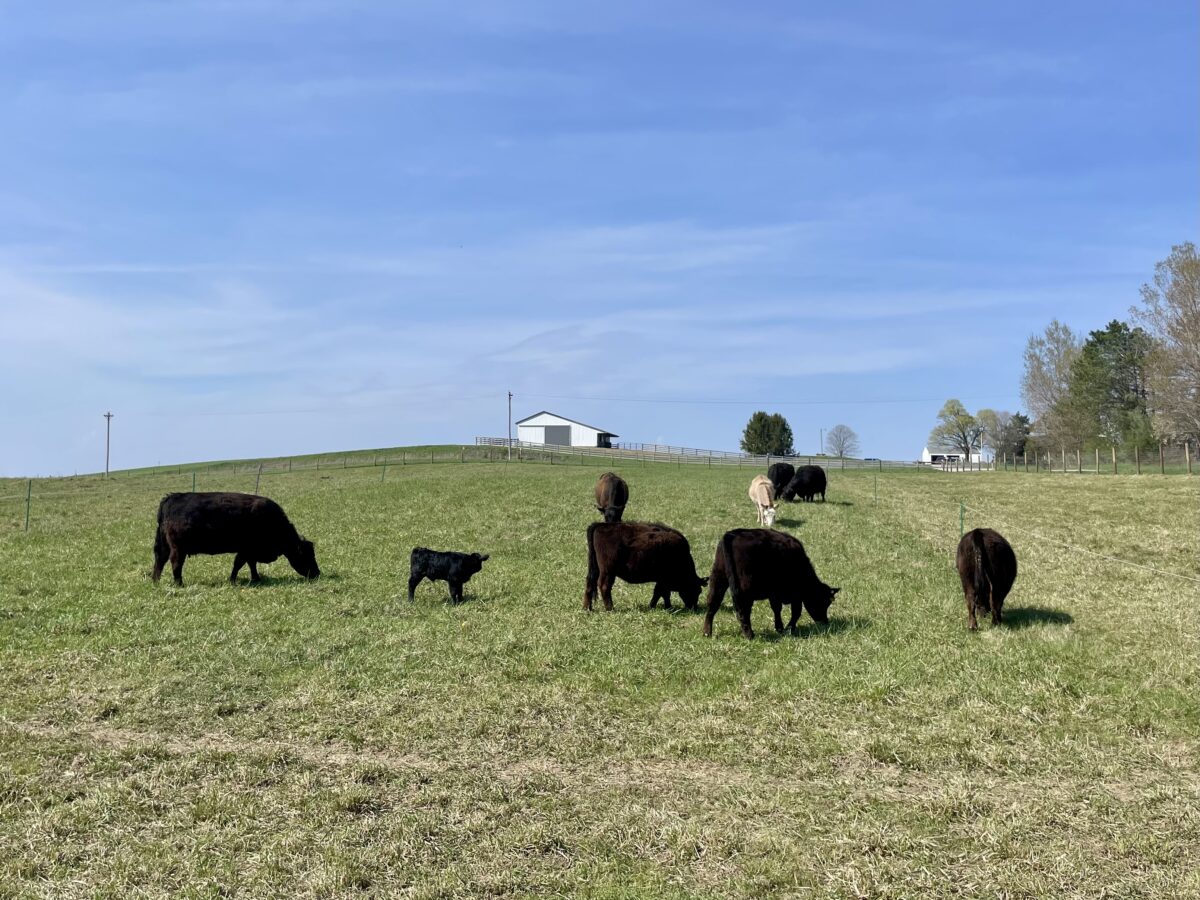The rolling hills of central Ohio make the drive to Lynd Fruit Farm a scenic one: Freshly planted fields and pastures dotted with cows, horses and sheep blur by as cars coast along country roads.
Nearing Blue Frog Farm — a Lynd farm that typically is closed to the public — drivers are met by 25 acres of land that is home to a steadily growing herd of Lowline Angus cows. It’s the farm’s first herd, and part of a recent regenerative agriculture project.
Andy Lynd, 60, now runs the family business that stretches back 105 years. He grew up on more than 100 acres at the family’s main farm on Morse Road in Pataskala.
“At the time, we didn’t have any animals,” Lynd recalled. “We had apples, peaches, pears, cherries, fruits. That’s what we grew. And I remember my dad saying, ‘If it gets out at night, we don’t want anything to do with it.’ So animals were out, you know; we just didn’t do that.”
Conventional agriculture is what Lynd grew up around, a process in which almost any problem can be dealt with a spray-bottle solution — meaning the land is commonly treated with herbicides, pesticides and fertilizers. Conventional methods rely heavily on what the United States Department of Agriculture refers to as “chemical intervention,” substituting nature with synthetic inputs.
Two winters ago, the family decided to remove trees from the property, opening 25 acres. Unsure what to do with the open space, but armed with just enough information on regenerative agriculture to be dangerous, Lynd decided to begin the process.
“I’ve always had an interest in trying to improve our methods of farming,” Lynd said. “The animal component is a piece of that puzzle.”
Breathing new life into depleted farmland, regenerative agriculture blends modern agricultural research with practices and methods lost throughout time. It works to enhance the natural system, improve soil health and restore biodiversity. Lynd’s goal: to produce healthier food and increase the longevity of farmland.
Happy with their apple growth in the past but always poised for improvement, Lynd picked up a book by Elliot Coleman, a farmer and agricultural researcher.
“He [Coleman] found that if you can get the system, the natural system, really humming, really going, working as it should, as it can, your plants do an awful lot to support their own defenses. It’s not perfect, but it’s close enough,” Lynd said.
The small herd now grazing on Lynd land on Sportsman Club Road, in northern Licking County, originally came from Indiana. Their owner, nearing retirement age, had several years experience with the animals and was looking to sell. Lynd went to visit the herd, and seeing that they were docile, decided to take them back to Ohio.
Long term goals for the cattle project at Lynd Fruit Farm are threefold.
First is a goal to improve soil quality, helping to limit erosion and keep soil from washing downstream after rainfall. All fruit produced there will benefit as a result of better soil, Lynd said.
Second, Lynd hopes to provide fresh grass-fed beef to the community through the farm’s retail market on Morse Road.
The product he hopes to provide is something more beneficial than beef purchased at the typical the supermarket, he said. Grass-fed beef is shown to have lower fat content than grain-fed beef, which can help offset health issues such as heart disease.
“If people understood the enormous price paid for the insatiable appetite of cheap food, they wouldn’t believe it,” Lynd said. “You don’t think about it; you just go buy your food. But if you knew the environmental costs, the health costs, it adds up, and you don’t really notice those things.”
The last goal for the cattle project is less tangible but clearly important to the family’s agritourism business: Cows for the sake of cows! The experience of passing by a happy herd while touring the farm in a wagon adds to the positive experience of the customers.
After all, one of the Lynd family’s favorite aspects of the business is knowing that the very literal fruits of their labor are making a positive impact on the community.
“The big deal around here is the impact you have on other people,” Lynd said. “And just to see the joy on peoples faces when they come out to the farm and partake in however they do it.”
Farmland in Alexandria, also owned by the family, was conventionally farmed for decades leaving behind depleted soil. To turn things around, Lynd hopes he can begin more regenerative farming there in the future, and possibly provide a home for goats, sheep or more cows.
Lynd is passionate about providing the best possible land for his business to grow in hopes of continuing the legacy of generations before him.
“The best answer is a long-term solution that it’s just a natural cycle that provides the plant [or] animal everything it needs, or most everything it needs, to function at a high level. So that’s the goal, that’s where we’re headed, I hope,” he said.
Lynd Fruit Farm Market opened for the season in April. The market at 9399 Morse Road SW is open from 10 a.m. to 5 p.m. Wednesday through Sunday. It is closed on Mondays and Tuesdays.
Annie Kennedy writes for TheReportingProject.org, the nonprofit news organization of Denison University’s Journalism program, which is sponsored in part by the Mellon Foundation and donations from readers. Sign up for The Reporting Project newsletter here.

